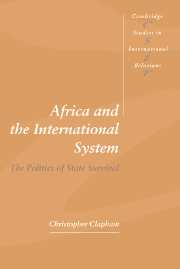Book contents
- Frontmatter
- Contents
- Acknowledgements
- List of acronyms and abbreviations
- Part I African states and global politics
- Part II Patterns of alliance
- Part III Struggling with decay
- 7 The international politics of economic failure
- 8 The Externalisation of political accountability
- 9 The International politics of insurgency
- 10 The privatisation of diplomacy
- 11 Conclusion
- Notes
- Bibliography
- Index
- CAMBRIDGE STUDIES IN INTERNATIONAL RELATIONS 50
7 - The international politics of economic failure
Published online by Cambridge University Press: 09 October 2009
- Frontmatter
- Contents
- Acknowledgements
- List of acronyms and abbreviations
- Part I African states and global politics
- Part II Patterns of alliance
- Part III Struggling with decay
- 7 The international politics of economic failure
- 8 The Externalisation of political accountability
- 9 The International politics of insurgency
- 10 The privatisation of diplomacy
- 11 Conclusion
- Notes
- Bibliography
- Index
- CAMBRIDGE STUDIES IN INTERNATIONAL RELATIONS 50
Summary
The failure of African economies
By far the most important factor underlying the international weakness of African states, and their vulnerability to internal fragmentation and external penetration, was their record of economic failure. The trajectories of different groups of Third World states since 1960, and notably the contrast between the capitalist states of east and south-east Asia on the one hand, and the states of sub-Saharan Africa on the other, provided the clearest indicator of the roles of economic success in ensuring political autonomy and diplomatic respect, and of stagnation and decay in leading to dependence on the uncertain and conditional charity of Western donor states and international institutions. There was, of course, no one-way causal relationship between economic failure and political weakness. The structure of African statehood certainly contributed to the dismal record of African economies, just as the structure of African involvement in global production and trade helped to induce political alienation and institutional decay. The economic and political crises of African statehood could most plausibly be regarded as different facets of a common complex of problems. From the early 1980s onwards, however, these problems were most clearly reflected in the economic needs of African states, and their subjection to the conditions imposed by external donors as the price for meeting those needs, which in turn became the overriding preoccupation of Africa's external relations.
Any attempt to quantify the economic failure of African states over the third of a century or so after most of them became independent is subject to the reliability of statistics which were affected by the same processes of institutional decay as the economies which they purported to describe.
- Type
- Chapter
- Information
- Africa and the International SystemThe Politics of State Survival, pp. 163 - 186Publisher: Cambridge University PressPrint publication year: 1996
- 1
- Cited by

